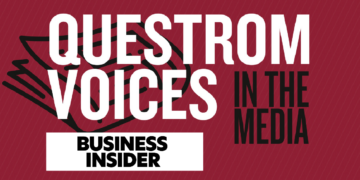Associate Professor of Management & Organizations Michael Anteby researches the role that ghostwriters play in creating “authentic” content for the people for whom they work.
We’re living in a moment that exalts the individual: we love our Hollywood superstars, celebrity CEOs, and internet influencers. As a result, many individuals are expected to churn out endless amounts of “authentic content.” Yet it is quite likely they are outsourcing its creation to ghostwriters, who receive limited or no credit for their contributions.
A study published in Social Forces Journal by Questrom’s Michel Anteby and Cornell’s Nicholas Occhiuto suggests that these ghostwriters, also known as stand-in workers, may be shaping these individuals’ personas in significant ways. “In a strange way, there were no two people in the [ghostwriting] relationship, but three: the ghostwriter, the talent, and the ‘crafted self’ of the talent.”
As part of the research, Anteby and Occhiuto interviewed more than 70 ghostwriters and publishing insiders who shared the process and experience of their work. They found that, in contrast to many professionals and creators, ghostwriters typically feel pride when their voice is not recognized. “One ghostwriter was elated when the daughter of the book’s subject told her that she could hear her father speak in the book,” Anteby says. “That meant that the ghostwriter had completely disappeared in the process, the highest sign of recognition.”
At the same time, many ghostwriters are adamant that they don’t just reflect the personality of the subjects they work for. They often aim to alter it, not unlike an artist with clay. When one subject asked the ghostwriter if she had a sense of humor, the ghostwriter gave a wry but illuminating reply: “Well, you’ve got the one I gave you.”
For Anteby, the research represents a nuanced look into a category of workers who stand-in for others but are never ‘seen,’ a group that also includes workers like coaches and resume writers. The research also shows that as we push for even more transparency and genuineness from the celebrities we admire, we may be getting far less of those things than we imagine. “We live in a society in which authenticity is hyper-valued, but what’s actually happening is we’re creating a labor market and an economy that thrive on altering the self,” Anteby says.


























